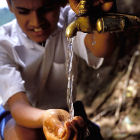22 November 2011
Water resources are under pressure from increasing populations, growing economies and poor management
 Flickr/World Bank Photo Collection
Flickr/World Bank Photo Collection
This policy brief, published by the International Project Office of the Global Water System Project and produced to inform the UN Conference on Sustainable Development (Rio+20), outlines how scientists and policymakers can advance water security by focusing on interdisciplinary research, and ensuring that all stakeholders are involved in developing sustainable solutions to water problems.
Rio+20 is an opportunity to strengthen commitment to integrated and sustainable management of water resources, which are coming under increasing pressure, say the authors. Water stress is a reality in many parts of the world and human activities are changing the global water system without adequate knowledge of the consequences.
Scientists can offer knowledge, information and technical tools. But this is only part of the solution: governments must set up frameworks for better water management, and many other stakeholders — including decision makers, managers and technical personnel — must be involved to foster commitment and facilitate conflict resolution.
As water crosses natural and political boundaries, governments must consider the water needs of all sectors. Better information will help to evaluate needs and prioritise water allocations between them. But the unavoidable compromises and trade-offs should be assessed based on scientific evidence — not influenced by lobbying and pressure groups.
Water management should be integral to climate change adaptation, and vice versa. To ensure water use stays within the planet's natural limits, interdisciplinary science should be complemented by ethical water governance and management practices.
Research shows that good governance depends on having multiple centres of control, effective legal frameworks, reduced inequalities, free access to information and meaningful participation by stakeholders. In turn, good governance can help attract needed funds for clean water and sanitation.
The future should be seen through a water 'lens', say the authors. They conclude that, in order to develop solutions for sustainable water management, it is important to go beyond technical solutions to understand the complexities of the global water system — including the social and political dynamics, as well as human behaviours related to water use. This is a huge challenge, say the authors, but it is the only way forward.
This policy brief was compiled by the International Project Office of the Global Water System Project based in Bonn, Germany. It was commissioned by the international conference Planet Under Pressure: New Knowledge Towards Solutions.
http://www.scidev.net/en/science-and-innovation-policy/science-at-rio-20/policy-briefs/developing-solutions-for-sustainable-water-management--1.html
Water resources are under pressure from increasing populations, growing economies and poor management
 Flickr/World Bank Photo Collection
Flickr/World Bank Photo CollectionThis policy brief, published by the International Project Office of the Global Water System Project and produced to inform the UN Conference on Sustainable Development (Rio+20), outlines how scientists and policymakers can advance water security by focusing on interdisciplinary research, and ensuring that all stakeholders are involved in developing sustainable solutions to water problems.
Rio+20 is an opportunity to strengthen commitment to integrated and sustainable management of water resources, which are coming under increasing pressure, say the authors. Water stress is a reality in many parts of the world and human activities are changing the global water system without adequate knowledge of the consequences.
Scientists can offer knowledge, information and technical tools. But this is only part of the solution: governments must set up frameworks for better water management, and many other stakeholders — including decision makers, managers and technical personnel — must be involved to foster commitment and facilitate conflict resolution.
As water crosses natural and political boundaries, governments must consider the water needs of all sectors. Better information will help to evaluate needs and prioritise water allocations between them. But the unavoidable compromises and trade-offs should be assessed based on scientific evidence — not influenced by lobbying and pressure groups.
Water management should be integral to climate change adaptation, and vice versa. To ensure water use stays within the planet's natural limits, interdisciplinary science should be complemented by ethical water governance and management practices.
Research shows that good governance depends on having multiple centres of control, effective legal frameworks, reduced inequalities, free access to information and meaningful participation by stakeholders. In turn, good governance can help attract needed funds for clean water and sanitation.
The future should be seen through a water 'lens', say the authors. They conclude that, in order to develop solutions for sustainable water management, it is important to go beyond technical solutions to understand the complexities of the global water system — including the social and political dynamics, as well as human behaviours related to water use. This is a huge challenge, say the authors, but it is the only way forward.
This policy brief was compiled by the International Project Office of the Global Water System Project based in Bonn, Germany. It was commissioned by the international conference Planet Under Pressure: New Knowledge Towards Solutions.
http://www.scidev.net/en/science-and-innovation-policy/science-at-rio-20/policy-briefs/developing-solutions-for-sustainable-water-management--1.html











No comments:
Post a Comment